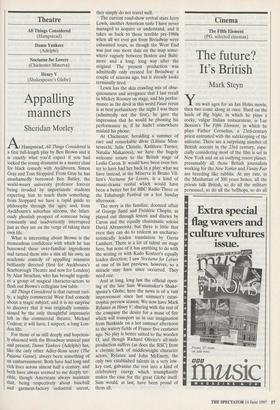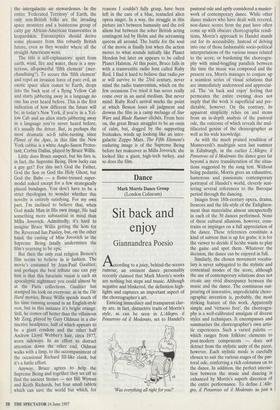Cinema
The Fifth Element (PG, selected cinemas)
The future?
It's British
Mark Steyn
You wait ages for an Ian Holm movie, then two come along at once. Hard on the heels of Big Night, in which he plays a cocky, vulgar Italian restaurateur, is Luc Besson's The Fifth Element, in which he plays Father Cornelius, a 23rd-century priest entrusted with the safekeeping of the universe. There are a surprising number of British accents in the 23rd century, espe- cially considering most of the film is set in New York and on an outlying resort planet: presumably all those British journalists working for the New Yorker and Vanity Fair are breeding like rabbits. At any rate, in the Manhattan of 300 years hence, all the priests talk British, so do all the military personnel, so do all the bellhops, so do all the intergalactic air stewardesses. In the entire 'Federated Territory' of Earth, the only non-British folks are the invading space monsters and a boisterous group of catty gay African-American transvestites in leopardskin. Eurosceptics should derive some pleasure from this robustly British future, even as they wonder where all the straight Americans went.
The title is self-explanatory: apart from earth, wind, fire and water, there is a mys- terious, all-powerful 'fifth element' (mer- chandising?). To secure this 'fifth element' and repel an invasion force of pure evil, an exotic space alien comes to Earth, drops into the back seat of a flying Yellow Cab and starts jabbering away in a language no one has ever heard before. This is the first indication of how different the future will be; in today's New York, if you're in a Yel- low Cab and an alien starts jabbering away in a language you've never heard before, it's usually the driver. But, in perhaps the most dramatic sci-fi table-turning since Planet of the Apes, in this film the New York cabbie is a white Anglo-Saxon Protes- tant, Corbin Dallas, played by Bruce Willis.
Little does Bruce suspect, but his fare is, in fact, the Supreme Being. How lucky can a guy get? For this isn't God the Father, God the Son or God the Holy Ghost, but God the Babe — a flame-tressed super- model naked except for a few strategically placed bandages. You don't have to be a strict theologian to wonder whether this novelty is entirely satisfying. For my own part, I'm inclined to believe that, when God made Man in His own image, He had something more substantial in mind than Milla Jovovich. Admittedly, it's hard to imagine Bruce Willis getting the hots for the Reverend Ian Paisley, but, on the other hand, the casting of Miss Jovovich as the Supreme Being fatally undermines the film's yearning to be epic.
But then the only real religion Besson's film seems to believe in is fashion. The movie's costumed by Jean-Paul Gaultier, and perhaps the best tribute one can pay him is that this futuristic vision is such an apocalyptic nightmare you could almost be at the Paris collections. Gaultier has stamped his look on everyone: as in the Die Hard movies, Bruce Willis spends much of his time running around in an English-style vest, but in this instance it's bright orange. Still, he comes off better than the villainous Mr Zorg, played by Gary Oldman in a dis- tinctive headpiece, half of which appears to be a giant condom and the other half Andrew Lloyd Webber's hair, circa 1977, worn sideways. In an effort to distract attention down the other end, Oldman walks with a limp, to the accompaniment of the occasional Richard III-like clank, but it's a futile effort.
Anyway, Bruce agrees to help the Supreme Being and together they set off to find the ancient Stones — not Bill Wyman and Keith Richards, but four small tablets which can save the world but which, for reasons I couldn't fully grasp, have been left in the care of a blue, tentacled alien opera singer. In a way, the struggle in this picture isn't between humanity and the evil aliens but between the sober British acting contingent led by Holm and the screaming queens all around. The battle for the soul of the movie is finally lost when the action moves to what sounds initially like Planet Hendon but later on appears to be called Planet Halston. At this point, Bruce falls in with a transvestite radio host called Ruby Rod. I find it hard to believe that radio per se will survive to the 23rd century, never mind the radio transvestism, which on the few occasions I've tried it has never really come over in an aural medium. But never mind: Ruby Rod's arrival marks the point at which Besson loses all judgment and drowns the film in a camp melange of Star Wars and Blade Runner cliches. From here on, the great Bruce struggles to be an oasis of calm, but, dogged by the supporting fruitcakes, winds up looking like an inter- galactic Zeppo Marx. The Fifth Element's enduring image is of the Supreme Being before her makeover as Milla Jovovich: she looked like a giant, high-tech turkey, and so does the film.











































































 Previous page
Previous page